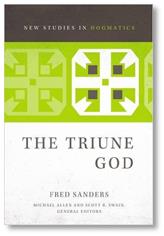Over the weekend, a friend sent me a copy of the 2013 article “The Obedience of the Eternal Son” by Scott Swain and Michael Allen. I want to commend this essay to anyone who has been following the recent debate about intratrinitarian relations. I also want to warn you that this is not light reading, and I may lose all but the specialists in what follows. Having said that, this article is worth your time to ponder and understand for the current discussion.
I’m not going to summarize the whole article, but I will give you its thesis and highlight a handful of other passages. Here’s the thesis:
The obedience of the eternal Son in the economy of salvation is the proper mode whereby he enacts the undivided work of the Trinity ‘for us and our salvation’. More fully, the obedience of the Son is the economic extension of his eternal generation to a Spirit-enabled, creaturely life of obedience unto death, and therefore the redemptive foundation for his bringing of ‘many sons to glory’ (Heb. 2:10). We will endeavor to establish this thesis in two steps. First, we will consider the relationship between the Son’s eternal generation and his economic obedience… Second, we will attempt to address three major objections that might be raised against our proposal: two classical and one modern… (p. 117)
What I like about this article is that it attempts to clarify the relationship between the Son’s eternal generation and his economic obedience. Swain and Allen express that relationship in these terms:
As Augustine long ago observed, the Son’s sending precedes his incarnation… Thus, the manner in which the Son works in obedience to his Father’s commission is not simply indicative of the state in which he assumed the formi servi but of his own proper filial relation to the Father, which precedes his assumption of the formi servi.
In short, the “sending” language of John’s gospel really does tell us something about the preincarnate Son’s relation to his Father.
The fact that the Son does not pursue his own initiative but that of the Father who sends him is not merely a consequence of the human form he assumed in the incarnation. The fact that the Son does not do his own will but the will of the Father who sent him is a consequence of his distinctive modus agendi, which follows from his distinctive modus essendi. More briefly stated: ‘ “to send” implies authority, and “to be sent” implies subordination to authority [subauctoritatis] in the order of eternal production in the Godhead‘. (p. 126)
They explain why the obedience of the eternal Son does not undermine the shared divine will.
The Son’s obedience to the Father in the work of salvation is not indicative of a second will alongside that of the Father but of the proper mode whereby Jesus shares the Father’s will as the only-begotten Son of the Father… [The Son’s] action is according to his Father’s charge. There is a noncompetitive relationship between [the Son’s] powerful will and his submission to the paternal will.
(pp. 127, 130-31)
They conclude:
The divine missions flow forth and manifest the temporal extension of the divine processions; the relations of origin within the triune life, then, shape the form of external works performed by the three persons together… The obedience of the eternal Son is not only exegetically necessary, but dogmatically coherent with the classic Trinitarian metaphysics of this Catholic and Reformed tradition. (p. 134)
There is much more to this thoughtful article, and I really do commend the whole thing to you. I’m still thinking through the implications of this. But my initial take is that it gives language to what I was trying to express in a chapter I wrote about the preincarnate submission of the Son to the Father. In fact, this is likely the language I will use going forward.
On a related note,  Swain and Allen are the general editors of Fred Sanders’s forthcoming work The Triune God (Zondervan, 2016). This work can’t get here soon enough. If anyone has a pre-pub version that they’d be willing to share, you would have the undivided essence of my gratefulness.
Swain and Allen are the general editors of Fred Sanders’s forthcoming work The Triune God (Zondervan, 2016). This work can’t get here soon enough. If anyone has a pre-pub version that they’d be willing to share, you would have the undivided essence of my gratefulness.




4 Comments
Pingback:
Pingback:
Pingback:
Pingback: